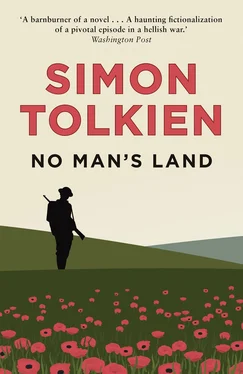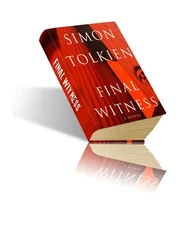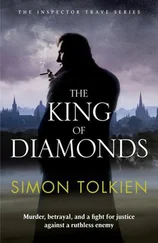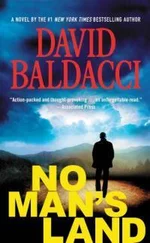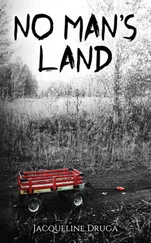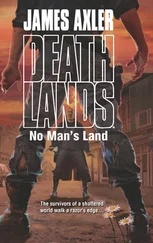SIMON TOLKIEN
NO MAN’S LAND
Published by HarperCollins Publishers
1 London Bridge Street
London SE1 9GF
www.harpercollins.co.uk
First published in Great Britain by by HarperCollins Publishers Ltd 2016
Copyright © Simon Tolkien 2016
The extract at the beginning of Part Five is copyright Siegfried Sassoon, by kind permission of the Estate of Siegfried Sassoon.
Cover design © HarperCollins Publishers Ltd 2017
Cover photograph © Shutterstock.com
A catalogue copy of this book is available from the British Library.
This novel is entirely a work of fiction. The names, characters and incidents portrayed in it are the work of the author’s imagination. Any resemblance to actual persons, living or dead, events or localities is entirely coincidental.
All rights reserved under International and Pan-American Copyright Conventions. By payment of the required fees, you have been granted the non-exclusive, non-transferable right to access and read the text of this e-book on screen. No part of this text may be reproduced, transmitted, down-loaded, decompiled, reverse engineered, or stored in or introduced into any information storage and retrieval system, in any form or by any means, whether electronic or mechanical, now known or hereinafter invented, without the express written permission of HarperCollins.
Source ISBN: 9780008100469
Ebook Edition © June 2016 ISBN: 9780008100476
Version: 2017-09-01
‘Vivid set pieces, notably a wonderful section down a mine, while Adam is an intriguing central character: clever, sincere and, amid the turbulence of early twentieth-century England, a determined survivor.’ Daily Mail
‘Simon Tolkien’s most ambitious work yet … Adam makes an attractive hero and his story has more than enough colour and energy to keep us reading.’ Sunday Times
‘In this emotionally charged novel, Tolkien brings to the fore the social injustice, poverty and attrition of war in early twentieth-century England. The scenes underground in the mines of Scarsdale are every bit as shocking as the harrowing descriptions of trench warfare when Adam and his comrades are repeatedly sent over the top.’ Sunday Express
‘A bittersweet coming-of-age tale … Peopled with a rich cast of sympathetic characters.’ The Straits Times
‘A page-turner, an opera, a costume drama to binge watch. Simon Tolkien knows how to keep a story moving, and he does it well.’ NPR
‘Rends the heart and sears the soul … A splendid novel that exemplifies historical fiction at its descriptive, disturbing, addictive and engaging best.’ Richmond Times-Dispatch
‘Tolkien draws from the World War I-era experiences of his famous grandfather J.R.R. Tolkien to spin a saga worthy of Masterpiece Theater.’ Kirkus Reviews
For
my daughter,
Anna Tolkien
This book honours the memory of my grandfather, J.R.R. Tolkien, who fought on the Somme between July and October 1916.
Table of Contents
Cover
Title Page
Copyright
No Man’s Land
Dedication
Epigraph
Part One: Childhood
Chapter One: Islington, London, 1900
Chapter Two
Chapter Three
Part Two : The Mine
Chapter Four: January 1911
Chapter Five
Chapter Six
Chapter Seven
Chapter Eight
Chapter Nine
Chapter Ten
Chapter Eleven
Part Three : The Hall
Chapter Twelve
Chapter Thirteen
Chapter Fourteen
Chapter Fifteen
Chapter Sixteen
Part Four : Call to Arms
Chapter Seventeen
Chapter Eighteen
Chapter Nineteen
Chapter Twenty: November 1915
Part Five : The Somme
Chapter Twenty-One: May 1916
Chapter Twenty-Two
Chapter Twenty-Three
Chapter Twenty-Four
Chapter Twenty-Five
Chapter Twenty-Six
Chapter Twenty-Seven
Chapter Twenty-Eight
Chapter Twenty-Nine
Chapter Thirty
Part Six : The Parting of the Ways
Chapter Thirty-One
Chapter Thirty-Two
Chapter Thirty-Three
Chapter Thirty-Four
Chapter Thirty-Five
Chapter Thirty-Six
Chapter Thirty-Seven
Part Seven : Ghosts
Chapter Thirty-Eight: February 1919
Chapter Thirty-Nine
Chapter Forty
Chapter Forty-One
Chapter Forty-Two
Chapter Forty-Three
Chapter Forty-Four: 10–11 November 1919
Acknowledgements
About the Author
Also by Simon Tolkien
About the Publisher
‘I cannot think of any need in childhood as strong as the need for a father’s protection.’
Sigmund Freud, Civilization and its Discontents , 1929
Chapter One
Islington, London, 1900
The first world Adam knew was the street. It came to him through his senses without mental dilution, filling up his head with sounds and smells and images that he couldn’t begin to unravel. Lying in bed at night with his eyes closed he could see Punch and Judy bludgeoning each other with rolling pins, just as if they were right there in front of him. Down they went and up they came, again and again: gluttons for punishment. He knew that Benson, the rag-and-bone man with the blue scar across his chin, was pulling the strings behind the tattered red curtain but that didn’t make the garishly painted puppets any less real. Just thinking about them made him laugh until his insides hurt, in the same way that he laughed years later in the bioscope when he saw Charlie Chaplin with his bow legs and stick and black moustache, marching confidently up the road towards his next disaster.
For a long time there was no cinema in Islington where they lived. There didn’t need to be – the street was a complete world, turning on its axis to the sound of the waltzes that flew up on a thousand notes out of the brightly painted barrel organ as the bald-headed grinder methodically turned the handle, looking neither to right nor left. He was solemn and sad and apparently unconnected to everything around him, even his monkey, which had a blue cap on its head with a tassel that bobbed up and down as it jumped around with the collection box. Sometimes the children danced to the music, weaving around each other in elaborate patterns, watching their feet to keep clear of the leaking tar and the horse manure. Some of them had no shoes and the tar was hard to get off the skin. You had to use margarine and even that didn’t always work.
The street was familiar and exotic all at the same time: a maelstrom of life. The muffin man carried his wares in a tray balanced on the top of his head; it swayed as he walked but it never fell. The fishmonger wheeled a barrow and, if he dared to look inside, the dead black eyes of the cod staring up out of the white-crystal ice made Adam shiver. And the flycatcher wore a tall black hat with long strips of sticky paper fastened to it, all covered with dead insects, calling out dolefully as he passed: ‘Flies, flies, catch them alive!’
On Saturday nights in summer Adam could look out of his bedroom window and see Baxter, the fat butcher in his bloodstained greasy white apron, standing in the doorway of his shop, lit up by the flare of a paraffin lamp, shouting out to the worse-for-wear men leaving the Cricketers’ Arms on the corner: ‘Buy me leg, buy me leg.’ It was because the poor man couldn’t afford to keep the meat cold overnight, Adam’s father told him; by morning it would be good for nothing.
And once a month two bent-over old men came slowly up the street, pushing a small cart with long handles, from which they sold solid blocks of salt. ‘Any salt please, lah-di?’ they asked in their sing-song foreign-sounding voices, holding up the white salt in their black fingerless gloves like an offering. Sometimes Adam’s mother bought from them and sometimes she did not. It depended on whether there was any money in the house.
Читать дальше
